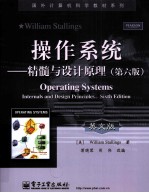图书介绍
操作系统 精髓与设计原理 英文版PDF|Epub|txt|kindle电子书版本网盘下载

- 蒲晓蓉编著 著
- 出版社: 北京:电子工业出版社
- ISBN:9787121112515
- 出版时间:2010
- 标注页数:604页
- 文件大小:155MB
- 文件页数:622页
- 主题词:操作系统-高等学校-教材-英文
PDF下载
下载说明
操作系统 精髓与设计原理 英文版PDF格式电子书版下载
下载的文件为RAR压缩包。需要使用解压软件进行解压得到PDF格式图书。建议使用BT下载工具Free Download Manager进行下载,简称FDM(免费,没有广告,支持多平台)。本站资源全部打包为BT种子。所以需要使用专业的BT下载软件进行下载。如BitComet qBittorrent uTorrent等BT下载工具。迅雷目前由于本站不是热门资源。不推荐使用!后期资源热门了。安装了迅雷也可以迅雷进行下载!
(文件页数 要大于 标注页数,上中下等多册电子书除外)
注意:本站所有压缩包均有解压码: 点击下载压缩包解压工具
图书目录
Chapter 1 Computer System Overview1
1.1 Basic Elements1
1.2 Processor Registers2
1.3 Instruction Execution5
1.4 Interrupts8
1.5 The Memory Hierarchy19
1.6 Cache Memory22
1.7 I/O Communication Techniques26
1.8 Recommended Reading and Web Sites29
1.9 Key Terms,Review Questions,and Problems30
Appendix 1A Performance Characteristics of Two-Level Memory32
Appendix 1B Procedure Control39
Chapter 2 Operating System Overview43
2.1 Operating System Objectives and Functions43
2.2 The Evolution of Operating Systems47
2.3 Major Achievements56
2.4 Developments Leading to Modern Operating Systems69
2.5 Microsoft Windows Overview72
2.6 Traditional UNIX Systems82
2.7 Modern UNIX Systems85
2.8 Linux86
2.9 Recommended Reading and Web Sites93
2.10 Key Terms,Review Questions,and Problems95
Chapter 3 Process Description and Control97
3.1 What is a Process?97
3.2 Process States100
3.3 Process Description115
3.4 Process Control124
3.5 Execution of the Operating System129
3.6 Security Issues132
3.7 UNIX SVR4 Process Management136
3.8 Summary141
3.9 Recommended Reading142
3.10 Key Terms,Review Questions,and Problems142
Programming Project One Developing a Shell146
Chapter 4 Threads,SMP,and Microkernels149
4.1 Processes and Threads149
4.2 Symmetric Multiprocessing(SMP)163
4.3 Microkernels167
4.4 Windows Vista Thread and SMP Management173
4.5 Solaris Thread and SMP Management178
4.6 Linux Process and Thread Management183
4.7 Summary186
4.8 Recommended Reading187
4.9 Key Terms,Review Questions,and Problems188
Chapter 5 Concurrency:Mutual Exclusion and Synchronization193
5.1 Principles of Concurrency194
5.2 Mutual Exclusion:Hardware Support203
5.3 Semaphores206
5.4 Monitors219
5.5 Message Passing226
5.6 Readers/Writers Problem232
5.7 Summary236
5.8 Recommended Reading237
5.9 Key Terms,Review Questions,and Problems238
Chapter 6 Concurrency:Deadlock and Starvation249
6.1 Principles of Deadlock249
6.2 Deadlock Prevention258
6.3 Deadlock Avoidance259
6.4 Deadlock Detection265
6.5 An Integrated Deadlock Strategy267
6.6 Dining Philosophers Problem268
6.7 UNIX Concurrency Mechanisms272
6.8 Linux Kernel Concurrency Mechanisms275
6.9 Solaris Thread Synchronization Primitives281
6.10 Windows Vista Concurrency Mechanisms284
6.11 Summary288
6.12 Recommended Reading288
6.13 Key Terms,Review Questions,and Problems289
Chapter 7 Memory Management295
7.1 Memory Management Requirements295
7.2 Memory Partitioning298
7.3 Paging309
7.4 Segmentation313
7.5 Security Issues314
7.6 Summary318
7.7 Recommended Reading318
7.8 Key Terms,Review Questions,and Problems319
Appendix 7A Loading and Linking321
Chapter 8 Virtual Memory328
8.1 Hardware and Control Structures328
8.2 Operating System Software347
8.3 UNIX and Solaris Memory Management365
8.4 Linux Memory Management371
8.5 Windows Vista Memory Management373
8.6 Summary376
8.7 Recommended Reading and Web Sites377
8.8 Key Terms,Review Questions,and Problems378
Appendix 8A Hash Tables382
Chapter 9 Uniprocessor Scheduling386
9.1 Types of Scheduling386
9.2 Scheduling Algorithms390
9.3 Traditional UNIX Scheduling412
9.4 Summary414
9.5 Recommended Reading414
9.6 Key Terms,Review Questions,and Problems415
Appendix 9A Response Time418
Appendix 9B Queuing Systems420
Programming Project Two The HOST Dispatcher Shell427
Chapter 10 Multiprocessor and Real-Time Scheduling432
10.1 Multiprocessor Scheduling432
10.2 Real-Time Scheduling445
10.3 Linux Scheduling460
10.4 UNIX FreeBSD Scheduling464
10.5 Windows Vista Scheduling466
10.6 Summary469
10.7 Recommended Reading469
10.8 Key Terms,Review Questions,and Problems470
Chapter 11 I/O Management and Disk Scheduling473
11.1 I/O Devices473
11.2 Organization of the I/O Function474
11.3 Operating System Design Issues478
11.4 I/O Buffering481
11.5 Disk Scheduling484
11.6 RAID491
11.7 Disk Cache500
11.8 UNIX FreeBSD I/O503
11.9 Linux I/O506
11.10 Windows Vista I/O510
11.11 Summary513
11.12 Recommended Reading513
11.13 Key Terms,Review Questions,and Problems515
Appendix 11A Disk Storage Devices517
Chapter 12 File Management528
12.1 Overview528
12.2 File Organization and Access534
12.3 File Directories538
12.4 File Sharing543
12.5 Record Blocking544
12.6 Secondary Storage Management546
12.7 File System Security554
12.8 UNIX File Management556
12.9 Linux File Management563
12.10 Windows Vista File System567
12.11 Summary573
12.12 Recommended Reading573
12.13 Key Terms,Review Questions,and Problems574
Glossary577
References587